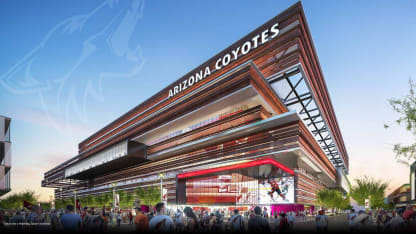"I think first and foremost it'll stop all the speculation as to what may or may not happen to the franchise," Commissioner Bettman said. "Secondly, it will, I believe, based on the locations I'm hearing about, ensure that from an attendance standpoint this franchise can thrive and I think it will assure the long-term future of this franchise beyond doubt."
The plan is for the Coyotes to play in the main arena, with the attached second facility being used for Coyotes practices, Arizona State athletics, youth hockey practices and games, and community events.
A second phase of the project is expected to include a hotel in the area.
The Coyotes have played in Gila River Arena in Glendale, Arizona, since December 2003. Prior to that, they played at America West Arena (now Talking Stick Resort Arena) in Phoenix after moving to Arizona from Winnipeg in 1996. They are expected to work toward finalizing an agreement with the city of Glendale to remain in Gila River Arena until their new arena is built.
The agreement between the Coyotes and the developer gives them until June 30 to create a budget, design and operational plan for the development.
"We are thrilled to partner with Catellus on this tremendous project that will include our future new home in the East Valley," Coyotes majority owner, chairman and governor Andrew Barroway said. "The Coyotes are committed to Arizona, and we are extremely excited about our bright future."
Coyotes president and CEO Anthony LeBlanc said the East Valley of the Greater Phoenix metropolitan area was targeted for their new home.
"While we have tremendous fans all across the greater Phoenix metro area, not to mention the entire state, it became clear that the East Valley is home to a majority of our fans and corporate partners," LeBlanc said. "Our fans in the West Valley have shown us tremendous support over the past 13 years, and we look forward to working with them as we transition to our new home in the future."
LeBlanc explained how important the new arena will be to the Coyotes going forward.
"It's probably the most significant thing we will do off the ice in our tenure as owner," LeBlanc said. "This is all about ensuring that we have a location that is easily accessible by the majority of our fan base. I know whenever you make a change like this, you are going to upset some people, and we understand that and it's unfortunate, especially so since we have so many great fans in the West Valley. … This is a very significant day for the Coyotes; we're just really excited to be at this point."
The announced site for the new arena, near Tempe Town Lake at the northwest corner of East Rio Salado Parkway and South McClintock Drive, is about 10 miles east of Talking Stick Resort Arena.
The Coyotes also had discussed the plan for a new arena with nearby Arizona State University, which moved its hockey program from AA to Division I two years ago. LeBlanc and ASU had discussed different concepts but ultimately decided that a big arena to house both teams made the most sense.
Barroway estimated the cost of the arena will be in the $400 million range.
"We want it to be a state of the art facility," he said, "best in class, and we want something that people are proud of and people want to go to in a location that's ideal and centrally situated for a lot of our fans. The stadium will be first rate, the drawings look gorgeous, we look forward to showing them to you in the future."


















